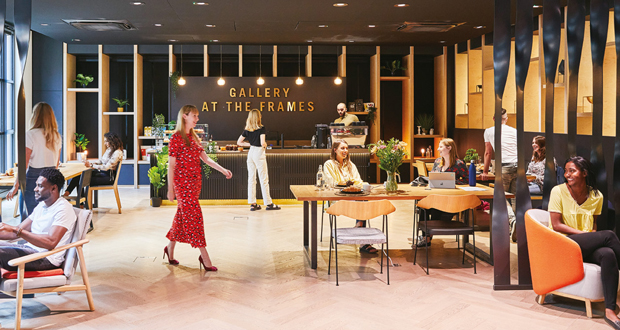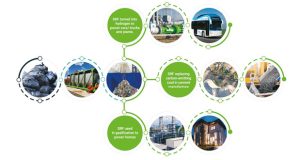KEY INITIATIVES IMPACTING BEHAVIOUR
The most common actions taken during the year of the competition break down primarily into engagement actions and technical adjustments. Eco-nudge posters in key areas start to encourage and prime tenants towards energy-saving. ‘Last-to-leave’ stickers posted near the door for example help to remind occupiers to turn off lights and other so-called vampire appliances, which drain power when left on standby every single night. The key is to ensure that any engagement material, whether it’s physical posters or building-app posts, communicates very clear and easy actions as well as translating potential energy savings into things that are meaningful to an individual. For instance, the energy slashed by the CUBE competition so far is enough to power London’s underground and overground rail networks for over six days! The posters are also key for starting conversations and building interest in getting involved in activities planned by the Green team.
One of the most impactful activities launched by some of the largest buildings in the competition has been whole building switch-off campaigns. Without the competition, rallying occupiers and managers to a common cause typically would have required significant engagement and legal support to allow tenants to alter lighting and heating schedules on their floors. By working collectively, towards a common positive goal, they have managed to switch off lights in the evenings and boilers during the summer, with some noteworthy London skyscrapers seeing savings of up to 5 per cent in a single month.
THE POWER OF ENGAGEMENT
Over the first year of the competition, CUBE has witnessed an exciting new relationship between landlords and occupiers, a positive one where they work together, united by a common goal that benefits everyone. We have seen landlords support tenants with deep-dive energy audits on tenanted spaces to identify quick wins in terms of energy and financial savings.
A great example is Landsec, working with Experian. The latter is one of several tenants based in 80-100 Victoria Street and, working in partnership on an energy deep dive, they saved 185MWh of energy – that’s equivalent to £27,000. Landsec also played its part, making chiller enhancements and BMS optimisations with AI learning to help the whole building become more efficient. Everyone benefits from interventions like these so the relationship dynamic shifts firmly from landlord as source of conflict to landlord as partner, which makes even more positive change possible.
The 30 participant buildings have achieved significant savings in the first 10 months of the competition, collectively saving a whopping 31GWh of energy, equivalent to almost £8 million in financial savings and 6 million kg CO2e. This is enough to power over 6,000 typical UK homes for a year – remember the importance of making achievements relatable!
The unique aspect of the competition is that the CUBE community has several opportunities to celebrate these savings as well as learn how to save even more through quarterly meetings. Having a dedicated space for landlords, building managers and occupiers to talk about similar challenges and being able to learn practical tips from each other has provided the drive to take on major issues like climate change. Even if you’re not part of CUBE, as facilities or sustainability managers, reach out to your landlords or building management company and start a dialogue. There’s more appetite for collaboration and change than you might think – we’ve seen it first-hand.
AND FINALLY
When it comes to such significant challenges as climate change and energy efficiency, it is not unusual to feel a level of inadequacy when viewing the limits of one’s own actions. However, knowing that there is a group of people, better yet a community, you are part of and with whom you can interact, helps provide reassurance and a reminder of the meaningful impact of collective action. Together everyone achieves more!
Our actions do not even need to be major, expensive changes. Starting small is better than not doing anything at all. After all, small actions will add up to big impacts, especially if there is a community behind you as well.
The major savings seen in the CUBE competition were achieved through actions that require little to no investments and minor changes. We need to avoid paralysis from the scale of the challenge ahead and commit to working together to take the first step. And what better way than to do this in a fun and engaging manner like the CUBE Competition?
REFERENCES
(i) https://bit.ly/3V5fap0
(ii) https://bit.ly/41RlUbZ
(iii) https://bit.ly/3N94SlQ
(iv) https://bit.ly/41UZF5g
(v) https://bit.ly/40zENz6






